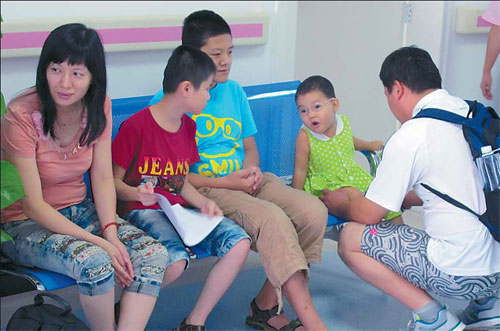Free diagnosis for eye disease patients during conference
|
Patients with inherited eye diseases waiting for a free diagnosis at the Beijing Genomics Institute's Youkang outpatient department in Shenzhen on Aug 18. Zheng Yanling (left) brought her 12-year-old son Ke Zewei (the second from left), who was blind through retina dysplasia, there. She was hoping the experts could find out whether the boy would one day be able to see and how to prevent passing the disease to the next generation. Huang Yuli / China Daily |
International experts assist institute in checking people with concerns
The Shenzhen-based BGI, formerly known as Beijing Genomics Institute, and the Shenzhen Ophthalmology Hospital held a free diagnosis for patients with genetic eye diseases in Shenzhen on Aug 18.
It was held during an international conference on genomics so prominent experts from both China and abroad joined the charity event, including Qi Ming, director of genetics diagnosis and consulting center at BGI, David Wilson, director of Casey Eye Institute at Oregon Health & Science University, and Liu Xuyang, deputy director of Shenzhen Ophthalmology Hospital.
Wang Yongquan, a patient who suffers from retinitis pigmentosa, said he saw the free diagnosis information on the patient forum www.rp-china.org and came specially from Guangzhou to Shenzhen for it.
The 24-year-old was diagnosed with the disability at the beginning of this year. It is an inherited disease that causes visual impairment or even blindness. Its most common symptoms include night blindness and limited vision.
"Ever since I was diagnosed with the disease I have been very worried," he said. "Although the night blindness I have actually doesn't affect my life much and my vision now is quite good - one eye is 1.0 and the other is 0.8 - better than many of my fellows, I'm afraid it could get poorer and poorer as I grow older. There is also a possibility I could lose my sight totally," said Wang.
He said a dozen people in his family have the disease so he is concerned about passing it on to any children he may have and he wants to know from the experts how to prevent that.
Tu Qipeng also suffered from retinitis pigmentosa. His symptoms are mainly night blindness and limited vision. He only has central vision, not peripheral, which means he can only see things that are straight in front of him.
The 40-year-old said the inherited disease had caused him many problems in life and he wanted an examination and advice from the experts to prevent him from losing his vision totally, a development he dreads.
"I'm so glad there is such a diagnosis. The experts are all top ones. It's not easy to meet them and it's free. Gene testing is very expensive. A friend of mine had three genes tested in Guangzhou and it cost 2,000 yuan ($314) and, because it's complicated, it took more than half a year to get the results," he said.
Zheng Yanling brought her 12-year-old son Ke Zewei for a diagnosis. The boy has retina dysplasia, also an inherited disease, which means he cannot see at all. His grandfather has the same disease. He now goes to a special education school in Shenzhen, which passed the charity event information on to them.
"I want the experts to have a look to see whether my boy will ever have a chance to see, even just a little. I took him to Guangzhou once for treatment but it didn't work out," she said. "If not, I'd like to know how to prevent it from being passed to the next generation."
Zhang Lei, project manager of BGI's clinical laboratories and reproductive health center, said the diagnosis will mainly help patients find out which gene mutation caused the disease. Then the experts will give treatment suggestions as well as instructions on any plans for having children.
"For instance, if some patients don't want to find out whether the baby is healthy until the mother is pregnant, we would suggest they may consider having a test-tube baby, which means they could first take one cell and check whether it's healthy before the fertilized egg is implanted into mother's uterus," he said.
He added each patient will have more than 300 genes tested and the results will be delivered in one or two months.
The free diagnosis was held again on August 21.





















